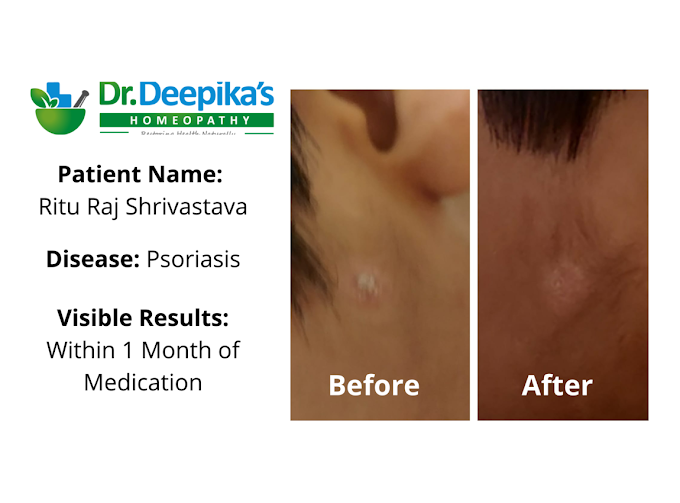Get Affordable and Best Irritable Bowel Syndrome (IBS) Treatment at Dr. Deepika's Homeopathy
Irritable Bowel Syndrome (IBS) Overview:
Irritable Bowel Syndrome (IBS) is a common gastrointestinal disorder that affects the large intestine. It is characterized by a range of symptoms, including abdominal pain, bloating, and changes in bowel habits. Dr. Deepika’s Homeopathy offers a reliable and natural approach to treating IBS, including homeopathic medicine for irritable bowel syndrome. This approach focuses on addressing the underlying causes and providing holistic care for long-lasting relief.
Facts About Irritable Bowel Syndrome (IBS):
Prevalence: IBS is a prevalent digestive disorder, affecting people of all ages. It is estimated that approximately 10-15% of the global population experiences symptoms of IBS.
Chronic Condition: IBS is a chronic condition, meaning it is long-lasting and can recur over time. While the exact cause is unknown, factors such as abnormal intestinal contractions, hypersensitivity in the gut, and disturbances in the gut-brain axis are believed to contribute to the development of IBS.
Subtypes: IBS can be categorized into different subtypes based on the predominant symptoms experienced by the individual. These subtypes include IBS with constipation (IBS-C), IBS with diarrhea (IBS-D), mixed IBS (IBS-M), and unsubtyped IBS (IBS-U).
Irritable Bowel Syndrome (IBS) can significantly impact a person’s quality of life, but with the right treatment, relief is possible. Dr. Deepika’s Homeopathy offers a reliable and natural approach to IBS treatment, addressing the underlying causes and providing individualized care for each patient. By focusing on stimulating the body’s own healing mechanisms, homeopathy offers long-lasting relief from symptoms and promotes healthy digestion. With Dr. Deepika’s expertise in homeopathy, patients can find relief from IBS, improve their digestive health, and enhance their overall well-being.
Disclaimer:
The information provided here is for educational purposes only and should not be considered medical advice. Treatment for irritable bowel syndrome (IBS) should be sought under the guidance and supervision of a qualified gastroenterologist or healthcare professional specializing in digestive disorders. Individual responses to treatment may vary, and it is important to consult with a healthcare provider for proper diagnosis, evaluation, and personalized treatment options tailored to your specific gastrointestinal health needs and circumstances.
Symptoms of Irritable Bowel Syndrome (IBS):
Abdominal Pain and Cramping: Often relieved by passing stool or accompanied by changes in bowel habits.
Diarrhea: Frequent loose stools, often with urgency to have a bowel movement.
Constipation: Infrequent bowel movements or difficulty passing stools, often accompanied by straining.
Alternating Diarrhea and Constipation: Some individuals with IBS experience alternating episodes of diarrhea and constipation.
Changes in Stool Appearance: Stools may vary in consistency and appearance, such as being watery, lumpy, or containing mucus.
Bloating and Gas: Feeling of abdominal fullness, bloating, and increased gas production.
Uncomfortable Bowel Movements: Sensation of incomplete evacuation after passing stool or feeling the need to return to the toilet shortly after bowel movements.
Abdominal Discomfort After Eating: Symptoms may worsen after consuming certain foods or beverages, especially those high in fat, fiber, or gas-producing substances.
Fatigue and Sleep Disturbances: Some individuals with IBS experience fatigue, disrupted sleep patterns, or symptoms worsened by stress or anxiety.
Symptoms Relieved by Bowel Movements: Many people with IBS find that symptoms improve after having a bowel movement.
Urgency: Feeling a sudden and urgent need to have a bowel movement.
Mucus in Stools: Passing mucus along with stools, which is common in IBS.
It’s important to note that IBS symptoms can fluctuate in severity and may be triggered or worsened by certain foods, stress, hormonal changes, or other factors. These symptoms can overlap with other gastrointestinal conditions, so it’s essential to consult a healthcare provider for an accurate diagnosis and appropriate management plan tailored to individual needs.
Diagnosis of Irritable Bowel Syndrome (IBS) :
Diagnosing IBS involves a thorough assessment to rule out other potential underlying conditions. Dr. Deepika follows a comprehensive approach that may include:
Medical History Assessment: A detailed discussion about the patient’s medical history, symptoms, and bowel habits helps in understanding the duration, triggers, and severity of the condition.
Physical Examination: Dr. Deepika may perform a physical examination to evaluate the abdomen for any signs of tenderness, bloating, or other abnormalities.
Diagnostic Tests: While there is no specific test to diagnose IBS, Dr. Deepika may recommend certain tests to rule out other conditions. These may include blood tests, stool analysis, or imaging tests like colonoscopy or flexible sigmoidoscopy.
Homeopathic Treatment for Irritable Bowel Syndrome (IBS) :
Dr. Deepika’s Homeopathy offers a natural and holistic approach to treating Irritable Bowel Syndrome (IBS). Homeopathic remedies, derived from natural sources, are safe, gentle, and non-toxic. The treatment focuses on addressing the underlying causes of IBS, promoting healthy digestion, and restoring balance to the gut. The homeopathic treatment may include:
Individualized Assessment: Dr. Deepika conducts a detailed assessment, considering the patient’s medical history, lifestyle factors, specific symptoms, and triggers. This helps in understanding the unique characteristics of the individual’s IBS and tailoring the treatment approach accordingly.
Customized Remedies: Based on the assessment, Dr. Deepika prescribes personalized homeopathic remedies that match the individual’s symptoms and address the underlying causes of IBS. These remedies aim to alleviate abdominal pain, bloating, irregular bowel movements, and other digestive symptoms.
Symptom Management: Homeopathic treatment focuses on providing relief from symptoms such asabdominal pain, bloating, and irregular bowel movements. The remedies work by stimulating the body’s self-healing mechanisms, reducing inflammation, and restoring balance to the digestive system.
Diet and Lifestyle Guidance: Dr. Deepika may provide guidance on dietary modifications, including identifying trigger foods and incorporating gut-friendly foods. Lifestyle recommendations such as stress management techniques and regular exercise may also be suggested to support overall digestive health.
Follow-up and Monitoring: Regular follow-up consultations are conducted to monitor the progress of the treatment and make any necessary adjustments to the remedy prescription. Dr. Deepika’s expertise ensures that the treatment plan is tailored to each patient’s specific needs.



EXCELLENTTrustindex verifies that the original source of the review is Google. GoodPosted onTrustindex verifies that the original source of the review is Google. Docters are very kind and help full Providing the best results and cure Really happy to share thi reviewPosted onTrustindex verifies that the original source of the review is Google. I approached her for my sinus treatment which I am having for years and she cured 90% of it in just 3 sittings and her approach is something I haven't seen with any of the doctor I met before, she is really good.Thank you so much doctorPosted onTrustindex verifies that the original source of the review is Google. She is best homeopathic doctor at sector 62, I was suffering from chickenpox , smallpox issue.. I got relieved from her medicine in 7 days.. Thanks doctorPosted onTrustindex verifies that the original source of the review is Google. What a miracle!! I contact Dr. Deepika's homeopathy for the treatment of external hemorrhoids. Result was unbelievable, withing 7 days it cured. Thanks for wonderful service.Posted onTrustindex verifies that the original source of the review is Google. Dr deepika Best doctor for kidney stone in noida.. You will get garateed relief within 30 to 45 days of medicine.. I got relief within 1 -2 doses only.







